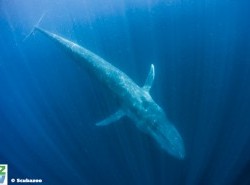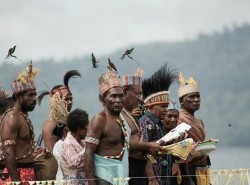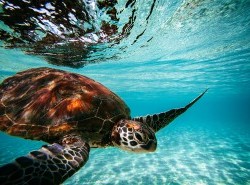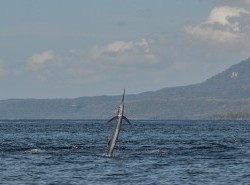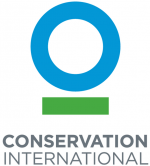Ever since prehistoric man first explored the archipelago that today we know as Indonesia, the incredible life that thrives on its coastlines, reefs and in the deep seas surrounding the islands, has been a vital source of sustenance for human society - providing an incredible bounty of food and valuable commodities.
A colorful community of elephant ear sponges, sea whips and sea fans, Misool, West Papua, Indonesia. The strong currents in the Misool area create perfect conditions for filter feeders such as soft corals, sea fans and sponges and in most areas, the rocky substrate is literally carpeted in life. In more sheltered areas, delicate hard corals also proliferate. The reefs of Raja Ampat are some of the most diverse and healthiest in the world
As populations have soared within Indonesia however, we have begun to realise that this source of food and livelihoods is not without limit - it is finite and fragile, easily damaged by overfishing, pollution and modern-day industrial practices that place budgets and the bottom line over sustainability.
A traditional outrigger fishing boat moored above a reef, Bunaken Marine Park, Manado, Sulawesi, Indonesia, Bunaken Marine Park is a very popular dive destination, famous for its beautiful coral reefs, marine biodiversity and vertical walls. Fishing is still allowed in parts of the park, as long as the fishermen use non-destructve and low impact methods such as hand-line fishing.
Exploring Indonesia today, it is easy to see that a turning point has been reached. Either we continue as we have done so for the last few decades - continue to overfish, continue to smother and poison reefs, continue to rip up coastal mangroves.
Reef fish for sale at the Paotere fish market, Makassar, Sulawesi, Indonesia.
Men preparing Roa fish for smoking, Bangga, Gorontalo, Sulawesi, Indonesia
Or we take a step back and look at how best to conserve the rich marine environment and utilise its resources in a way that ensures the varied life found here has a future, along with the many people that depend on it for their food and livelihoods.
Grouper at a live fish holding facility, Makassar, Sulawesi, Indonesia. The grouper are destined for export to Hong Kong. The live reef fish trade is a highly lucrative business worth around US$1 billion a year It is also associated with several highly destructive fishing methods, including the use of cyanide to stun and capture the fish alive.
Voracious global markets have driven the fishing industry to extract more and more from Indonesia's marine territories - often illegally. Many of these industries are severely under regulated and foreign fishing boats regularly encroach on Indonesian fishing grounds without permits. The use of cyanide and dynamite to stun and kill fish is still prevalent.
Thresher shark with fins removed for sale at Paotere fish market, Makassar, Sulawesi, Indonesia. Shark finning is still big business across Indonesia, despite high profile campaigns in Hong Kong and mainland China encouraging consumers and businesses to drop shark fin soup from their menus. Meanwhile, it's thought that shark populations are in free fall in many places.
Sharks have been aggressively targeted by fishers in recent years thanks to the popularity of shark fin soup amongst an increasingly aflluent middle class in many Asian countries. No one knows precisely what impact this will have on shark populations in the long term, but it could well be catastrophic. As peak predators, sharks play a key role in the health of marine ecosystems like coral reefs, maintaining balance.
Fisherman cutting up a mobula ray, Jimbaran, Bali, Indonesia. Mobula rays caught by fishermen, Bali, Indonesia. The fisherman is cutting meat from the ray, which is then sold for food. In recent years, demand for gill rakers from mobula and manta rays for use in traditional Chinese medicinal preparations has dramatically increased. But in 2014, Indonesia declared all of its territorial waters a sanctuary for rays and arrests of illegal traders have already taken place, indicating the government's commitment to enforcing the sanctuary.
Studies have clearly indicated that both sharks and rays are of much greater value alive than they are dead. The challenge is to shift behaviour and establish blue economies that enable local coastal communities to benefit from industries like dive tourism so that they have a genuine stake in conserving these magnificent creatures.
Manta rays gathered above a cleaning station, Raja Ampat Islands, West Papua, Indonesia. The mantas are being cleaned by small wrasse. The Raja Ampat Islands in West Papua are famous for their extraordinary marine biodiversity. The reefs around these islands are thought to be some of the most biodiverse on the planet.
Hawksbill turtles are endangered throughout their range, a result of hunting (primarily for their shell - the source of tortoise shell for jewellry), fishing practices and exploitation of their eggs. Pulau Weh lies at the most north westerly tip of Indonesia, where the Indian Ocean meets the Andaman Sea. The deep water and strong currents that sweep past the island provide perfect conditions for both large and small marine species. The island has active volcanic vents that emit sulphurous gases and lies close to an active subduction zone. Pulau Weh lies just off shore from Banda Aceh, the city that was devastated during the 2004 tsunami.
Already there are signs of change. Tiny coastal communities, from Banda Aceh in the east across to West Papua, now work in conjunction with NGOs and the Indonesian government, helping to develop ways of sustainably utilising their own reefs and mangroves.
Island ranger excavating a turtle nest after the juveniles have hatched, Sangalaki, Kalimantan, Indonesia. The nests are excavated to determine the percentage of eggs that hatched. Sangalaki is part of the Derawan Island group, off East Kalimantan. The island is famous for its reefs, manta rays and cuttlefish, and as an important nesting site for the endangered green turtle. Sangalaki was a popular tourist destination, until the Indonesian government closed down access to the island in 2009
Great barracuda with a diver on the Liberty Wreck at Tulamben, Bali, Indonesia. Tulamben is located on Bali's NE coast and has become very popular with divers and photographers. The area is famous for the wreck of the USAT Liberty Glo, a WWII era ship that lies just off the beach in Tulamben village. The areas is also very well known for its high marine biodiversity. Bali is a very popular holiday destination for divers and offers a wide variety of different types of diving, from reefs and wrecks to mucks sites such as Puri Jati and Gilimanuk
They are trained in alternative industries such as sea weed farming or taught innovative techniques and given access to markets to ensure that the money generated by their own backyard reefs returns to the village. Tourism has become a vital source of employment and income, proving that local reefs and the marine life they support are more valuable when they are flourishing and healthy, rather than overfished and smothered.
The Biorock process was developed by Thomas Goreau and Wolf Hilbertz in the 1970's. Electricity is used to promote the deposition of calcium carbonate, and to a lesser extent magnesium hydroxide, which build up on the surface of the cathode. Hard corals quickly bond to this material and the process is thought to accelerate coral growth by up to four times. The resulting 'reef' of hard coral soon attracts other inhabitants. Biorock structures - metal frames connected to an electrical supply on the surface - have been used in the Maldives, Bali, PNG, the Seychelles, Japan and the Caribbean, and the process has been touted as a way to rehabilitate reefs in all tropical areas.
These village-scale initiatives are just small parts of much larger projects that focus on entire ecosystems and the communities that rely on them. In Pemuteran, local communities with the help of prominent scientists, have established a network of Biorock artifical reefs, which are rescuing fishing grounds, educating the next generation about marine conservation and generating tourism revenues.
Member of Nature Awareness Group planting seedlings in a mangrove rehabilitation area, Bangga, Gorontalo, Sulawesi, Indonesia.
Bapak I Nyoman Yasa working on his seaweed farm, Kutuh, Bali, Indonesia. Seaweed is used extensively in the cosmetic and culinary industries and can be a good alternative livelihood for former fishing communities, though the market price can fluctuate considerably.
By examining the myriad connections within these systems and gaining an understanding of how each small part plays its own, vital role, we have begun to build a framework that incorporates the views and needs of the people of Indonesia, preserves the environments on which they depend and yet allows for the sustainable use of the life found in Indonesia's rich seas.
Women harvesting sea weed for agar agar at a small village, Ujung Baji, Takalar, Sulawesi, Indonesia.
Seaweed farm at dawn, Kutuh, Bali, Indonesia.
